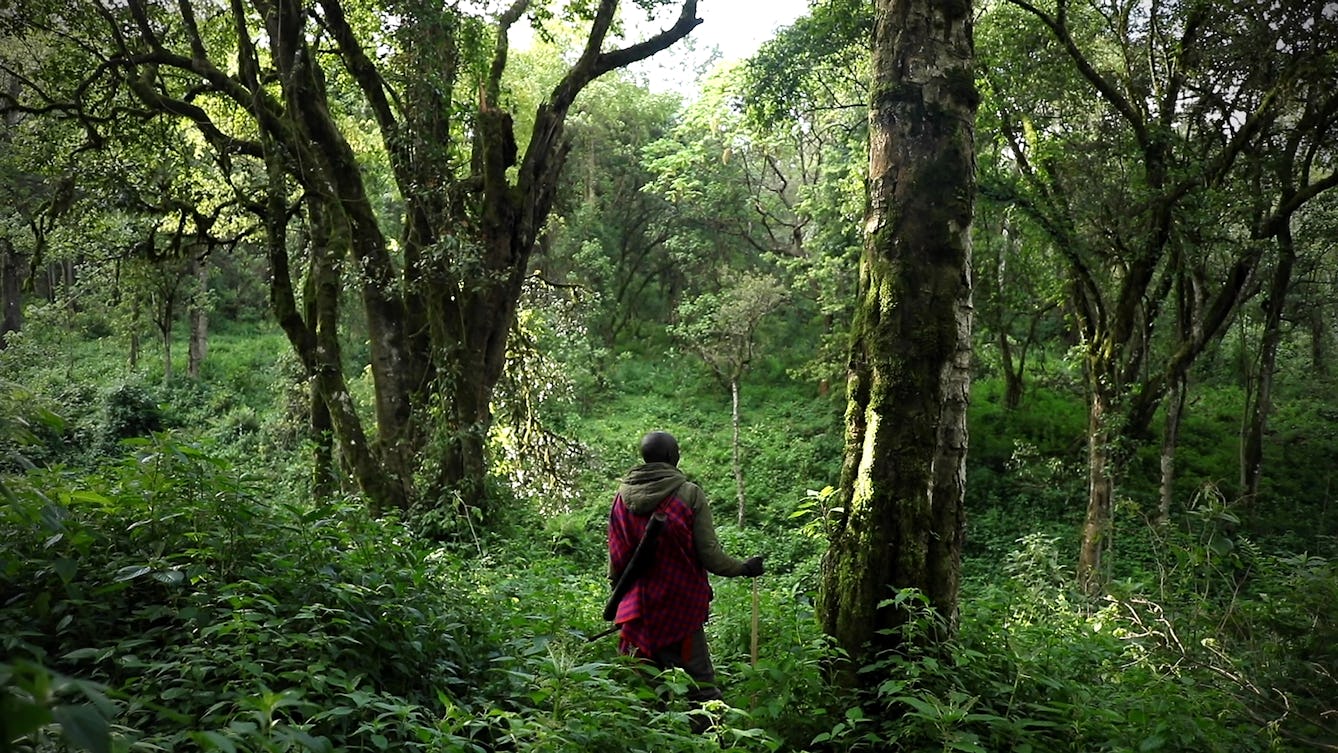Land Body Ecologies at The Hub

Stephen Ngusilo, an Ogiek Elder, walks through the Mau Forest in Kenya, one of Land Body Ecologies Hubs. © Jason Tyler. Courtesy of Land Body Ecologies.
The residents at The Hub for 2021–24 were Land Body Ecologies (LBE), a global transdisciplinary network that explores the relationship between mental health and ecosystem health.
LBE were our fourth Hub residents. They bring together artists, expert communities, researchers, designers, conservationists, technologists and activists from fields including psychology, arts, human rights, sustainability, sociology, design and medicine.
Together they researched the phenomenon of solastalgia, a developing field of global health, defined as the emotional or existential distress caused by environmental change and land-rights issues. Environmental philosopher Glenn Albrecht, who coined the term, describes it as “the feeling of homesickness while you are still at home”.
LBE was initiated by Invisible Flock, a multi award-winning interactive arts studio and grant recipient of the Hub Award. LBE is The Hub’s first international project.
As a decentralised group collaborating across teams and locations, aiming to strike a careful balance between autonomy and collaboration, it was important for LBE to expand the concept of The Hub as a single place to a network of hubs. Thus in addition to The Hub in central London at Wellcome Collection, LBE set up community-embedded research centres across six other localities. At the heart of the project are Indigenous and land-dependent communities including Ogiek in Kenya, Batwa in Uganda, Pgak’yau (Karen) in Northern Thailand, Sámi in Sápmi, as well as communities living in the buffer zones of the Bannerghatta National Park in India and communities affected by the damming of rivers in Northern Finland.
“Environmental trauma links to important place-based aspects of life; it threatens the sources of livelihood, emotional bonding with the environment, a sense of collectivity, personal and family histories, community history and memories. Trauma is not only caused by the event that changed the environment, but also by its consequences: a sense of injustice, disappointment in society, powerlessness and understanding that one has no say and cannot influence events, or that resistance feels very difficult or useless.”
The Hub space during the LBE residency acted as a creative studio, providing a base for the group’s transdisciplinary and collaborative research as well as acting as a site for dialogue and engagement with different stakeholders and audiences. The research involved mixed methodologies across arts and science practices, data-gathering and storytelling, advocacy, activism and public events. The group also received unique access to resources and teams in Wellcome and Wellcome Collection.
The Hubs
Land Body Ecologies is anchored by Invisible Flock (UK), Minority Rights Group (UK), Action for Batwa Empowerment Group (Uganda), Ogiek Peoples’ Development Program (Kenya), Quicksand (India), University of Oulu (Finland), Lazy Man Coffee (Thailand) and independent artist Jenni Laiti (Sápmi).
Arctic Hub, Finland – anchored by Outi Autti (Giellagas Institute, University of Oulu).
Sámi Hub, Sápmi – anchored by Jenni Laiti (Sápmi-based).
Bannerghatta Hub, India – anchored by Quicksand.
Bwindi Hub, Uganda – anchored by Action for Batwa Empowerment Group.
London Hub, United Kingdom – anchored by Invisible Flock and Minority Rights Group International.
Mau Forest Hub, Kenya – anchored by Ogiek Peoples’ Development Program.
Ban Nong Tao Hub, Thailand – anchored by Lazy Man Coffee, founded by Siwakorn Odochao.
The Hub leads
Victoria Pratt is a multi-award-winning artist and co-founder and Creative Director of Invisible Flock, creating work through developing and leading research processes and long-term collaborations, often taking the form of installations where human and planetary health meet.
Babitha George and Romit Raj are from Quicksand, an interdisciplinary design research and innovation practice based in India, driven by an approach that seeks to build on a rich, evocative understanding of people and environments through participatory research and co-design.
Daniel Kobei is the founder and Executive Director of Ogiek Peoples’ Development Program, a non-governmental organisation based in Kenya that promotes the human and land rights of the Indigenous Ogiek.
Jenni Laiti is a Sámi artivist, Duojár (master of traditional Sámi crafts), Indigenous rights activist and climate justice advocate.
Outi Autti is a sociologist and researcher at Giellagas Institute, University of Oulu. Outi specialises in multidisciplinary research in the fields of environmental sociology, migration studies, rural education and human geography.
Samrawit Gougsa is Head of Communications at Minority Rights Group International (MRG). MRG is an NGO focused on advocacy and human rights for ethnic, religious and linguistic minorities, and Indigenous peoples globally.
Siwakorn Odochao (Swae) is a Pgak’yau (Karen) farmer specialist in rotational farming, founder of Lazy Man Coffee and facilitator, from Ban Nong Tao, Northern Thailand.
Sylvia Kokunda is the founder and Chief Executive Officer of Action for Batwa Empowerment Group (ABEG) in Uganda, a Batwa-led NGO supporting the Indigenous Batwa community.
You can follow their progress on:
Instagram @landbodyecologies
Twitter @LBecologies
Facebook @landbodyecologies